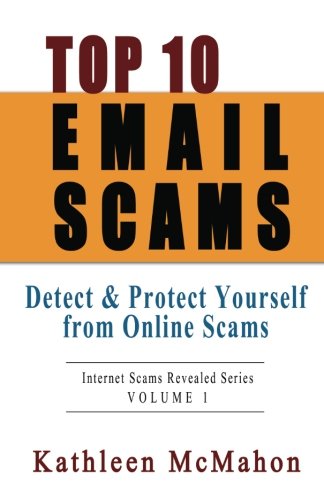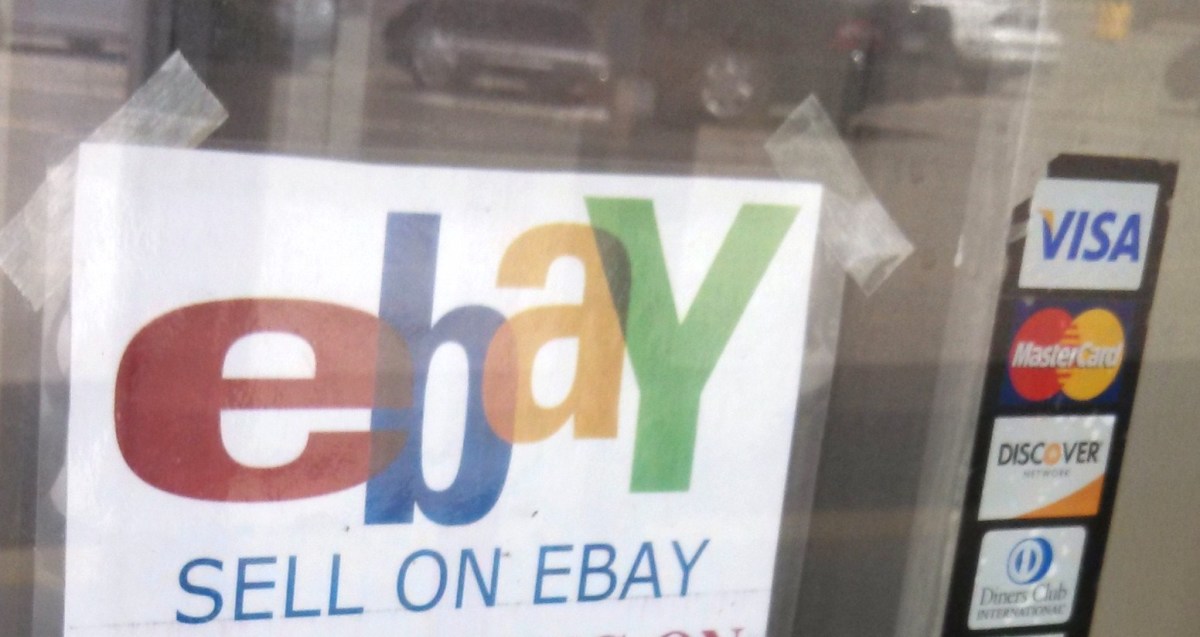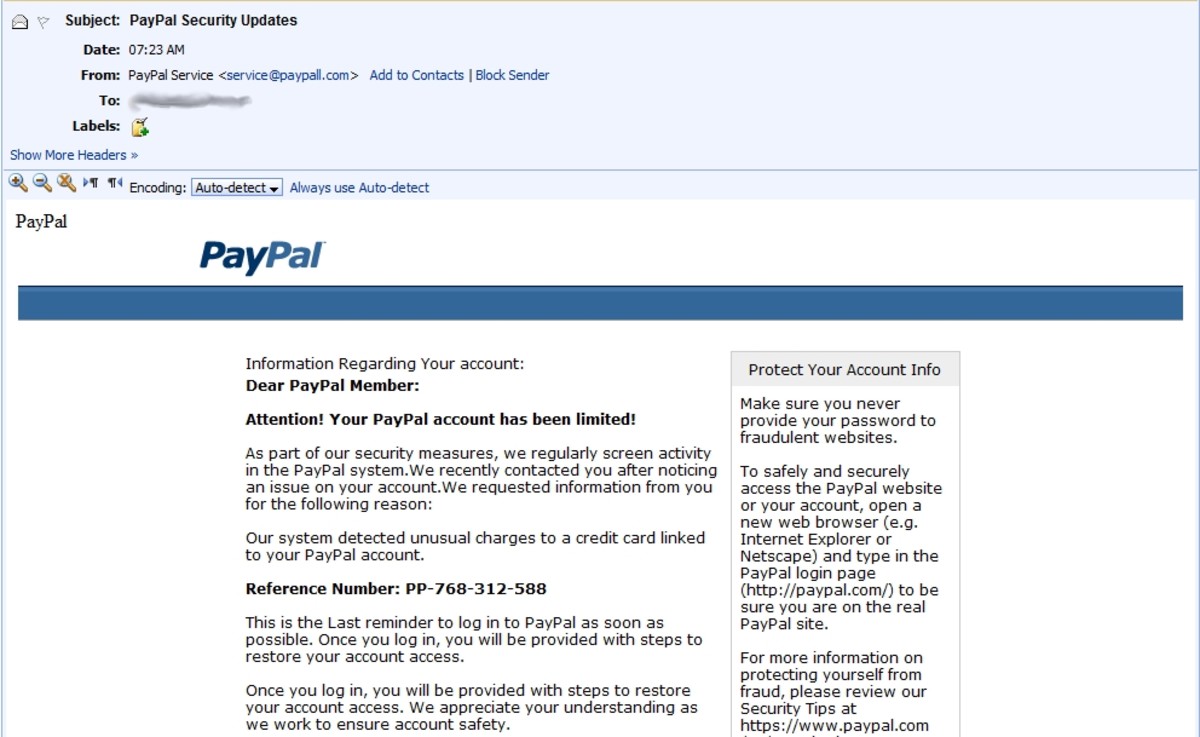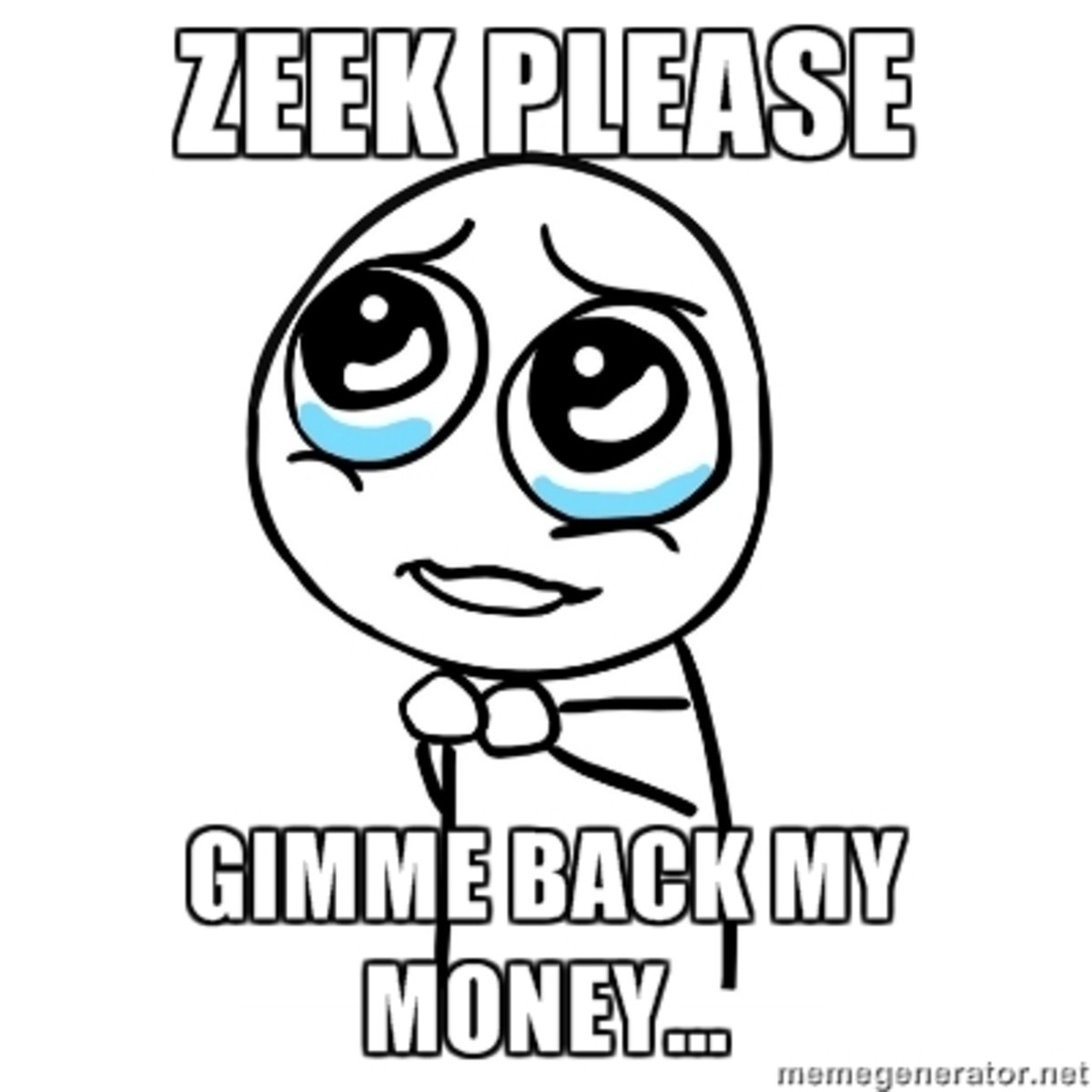What Are Nigerian 419 Scams And What To Do If I Get Them In My Inbox

So What Exactly Are Nigerian 419 Scams?
Nigerian 419 scams are called under several other names. You might have heard of them as 419 scams, Nigerian scams, email scams, advance fee scams, and the list goes on. They all represent a very particular type of scam where a victim is persuaded to pay money in advance in order to receive a larger sum of money later on, money which in fact doesn't exist and will never be paid by the scammers.
While these scams can be used in various ways, including email, Facebook, eBay, Skype, telephone and dating sites, here we will be focusing on the most common type, which is done through email correspondence.
Many free email hosting services such as Gmail, Yahoo, Hotmail have already filters in place to find these scam emails arriving to a person's inbox and dump them straight to the Spam folder, however scammers these days are very creative, and such fraud mails will occasionally pass the filters and land in the Inbox.
The name of Nigerian 419 scams, comes from the fact that the modern versions of these fraud letters were indeed coming from Nigeria. However today they can arrive from any part of the world, including even the US or Western Europe. An IP trace of such incoming emails showed their origin to be very varied indeed.
Letters Of Jerusalem
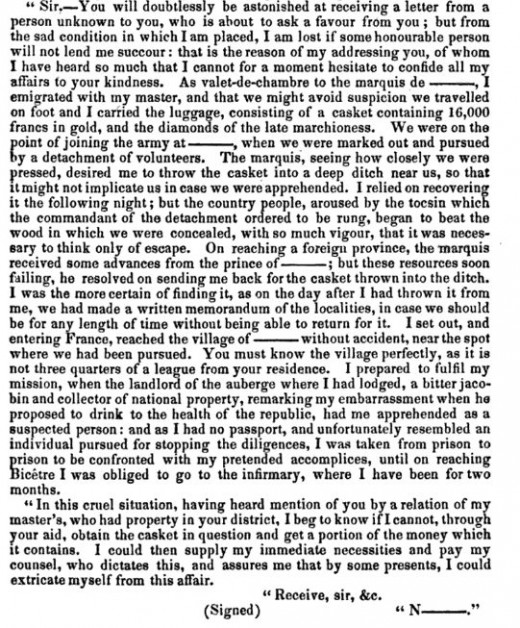

It Started With The Letters Of Jerusalem
The first advance fraud scams appeared around 1830, which were detailed with the title Letters Of Jerusalem in the Memoir of Eugene Francois Vidocq.
In these letters the scammer would say that they have trunks full of gold and other valuables which need transported from one place to another without anyone finding out about them. Then they would send these letters to rich persons who were living in the nearby province, who would be duped into agreeing to help transport those caskets. When the marquis in question would go back for the promised money, he would be imprisoned for not having any sort of identification with him.
With at the time a rate of 20% success, these scams kept appearing because people kept falling for them. For many people today it is impossible to believe that anyone cal fall for it.
However sadly they are working, because first, scammers know that it is very hard for the authorities to find them, let alone punish them, and second, people always fall for them. Innocent, yet gullible people abound in every country, and once they lost their money (sometimes over and over again until they realize that they have been duped), they feel ashamed to come forward and say they have been swindled.
Have you ever been a scam victim?
The Current Advance Fee Scams - Aka The Nigerian 419 Scams
The number 419 in this scam name comes from the relevant section in the Nigerian law which calls out "Any person who by any false pretense, and with intent to defraud, obtains from any other person anything capable of being stolen, or induces any other person to deliver to any person anything capable of being stolen, is guilty of a felony, and is liable to imprisonment for three years. (http://www.nigeria-law.org/Criminal%20Code%20Act-Part%20VI%20%20to%20the%20end.htm)
In the 1980s the economy in Nigeria tumbled drastically due to drop in oil output and sharp drop in prices. Since the Nigerian economy relied strongly on its petroleum, the GNP per capita decreased to new lows. The first of such scams were pulled on visiting Western businessmen who got pulled one over by unemployed students.
As technology advanced, with the introduction of fax machines, and later the internet with easy email accessibility, the scam spread life fire. And with millions of people to dupe from all over the world, it has gone beyond Nigeria. I have personally received emails from Ghana, Ivory Coast, South Africa, Japan, Poland, Russia, Germany and Iran.
Today every person who has an email address - and let's face it 90% of the world population has at least one - will have received several such sweet or official sounding letters that many people simply can not resist replying to. These letters appeal to some very human emotions, from charitable feelings to greed, to wanting to help those in need, to feeling desperate enough to accept help from shady places when the government does nothing to help its own people.

How Do The Nigerian 419 Scams Work?
We have already established that this fraud goes beyond the Nigerian borders, however for the sake of keeping it consistent, I will be referring to this name through this entire article.
The scam generally works in 4 main steps, all based on prewritten scripts.
Step 1 - The initial contact
This is a letter which is often written with perfect grammar, appearing to come from either official sources or from someone in dire need of urgent help.
It is intended to appeal to your curiosity. It is intended to make you want to read it. And that is, most often than not, enough to get you hooked enough to get you to reply.
Step 2 - Appealing to your senses
Once you have replied stating your interest, you will soon receive a seconed email. This email is rather vague, but will promise a reward for very little effort from your part. Sometimes it will be already spellt out how much money you need to send in order to get the millions, however more often than not tha part is left out - afterall the scammer doesn't want to scare you away just yet.
One thing is clearly spelled out is how much money you will get. The reward is usually listed in millions. This is where some document (either a jpg image or a pdf file) will be attached to their email, in order to prove that they are legitimate barristers or officials.
Step 3 - The amount you have to contribute is spelled out
Once you have replied to that email as well, the scammer knows you are hooked. He has given you a glimpse of what can be yours - 1 million, 10 millions, 25 millions of US dollars, now he can with the amount you will need to pay in order to get hold of huge reward.
What the con artists count on at this point is the major discrepancy between the amount with many trailing zeroes and the tiny sum - usually anywhere between $89 and $2500 that you are presented with. A person who is truly hooked on this scam will not even bat an eye at the small sum he or she has to pay. Afterall that's a drop in the ocean compared to what his reward will be soon.
Step 4 - Pay more
Once the victim pays the criminals the first money, there will be an attempt by the scammer to squeeze more money ouf of the victim. Afterall if he paid once, he can and often will pay more.
This is the sage where there will be various blocks that prevents one from getting the money. There will often be additional unforeseen and unavoidable costs to pay. There will be bribes for getting even more money for that extra 10% of additional fees.
Once the victim has paid several times, there will be a feeling that he has already paid so much, that indeed the big reward is just around the corner. He will not stop now. If you have ever played at the casino, you know the feeling very well.
When the person is extremely gullible, he will be asked to travel to the scammer's country to to sign the contract and pick up the millions. This is usually when the victim is either kidnapped for ransom, or even worse, robbed and killed.
What Types Of 419 Scam Emails Are There?
Only last week I received about 7 different types/formats of such emails. I will present you with a few, so you can learn to recognize them.
ATM Card 419 Scams
This is a very popular scam in that a person is promised a credit card which is loaded with millions anywhere in the world that accepts ATM cards.
The only obstacle? The payment of a tiny sum of money in order to receive the card. Afterall the sender has to pay the fees, the postage and courier to send the card to the victim and all sorts of other things that they can come up with
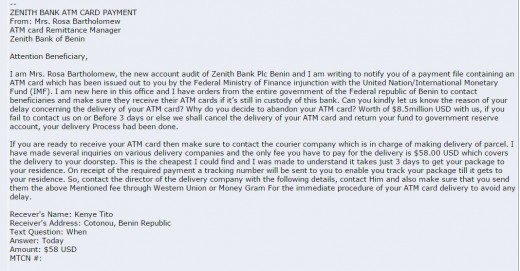
Compensation Scams (For Having Been Scammed In The Past)
Another popular scam, because many people have indeed been victims of various frauds and it is not impossible to conceive that one of these randomly sent emails will hit one of these previous victims.
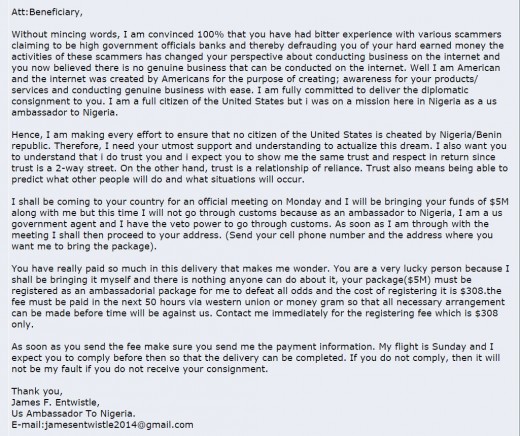
Compensation For Past Efforts
You have helped someone in the past (even if you don't remember anymore), here is your compensation
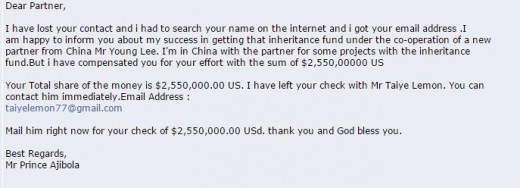
Box To Be Picked Up With Your Name On It
An email which claims that a box with the person's name is abandoned someplace (often at an airport) and it needs to be picked up. The victim has to pay a small fee in order to recive the box, which often seems to contain family heirlooms.

Additional Email Scam Types
These are just a few examples of emails that dropped in my Inbox (well actually I fished them out of my Spam folder) this last week.
There are many more types out there, including the cashier's check scam, charitable organization scam, extortion scam (this one is particularly nasty in that it threatenes to kill the victim if he doesn't pay), next of kin scam, romance scam, and so on.

How To Recognize And What To Do If You Get Such Emails
While many of these email types are easy to figure out, there are some that might throw a person off its balance quite easily. We all thing we are immune to such things, but considering that every year scammers get over US$1.5 billion, with the victims paying out on average US$20,000 per year, scamming seems to be quite the lucrative 'business'.
Here are a few points to pay attention to when receiving such a letter.
1. Is the email in the Spam folder? If yes, it is more than likely it is a scam. Leave it there, or better yet, delete it entirely.
2. When you open the email, check out to whom it is addressed. Scammers do not know your name, so as a greeting they will usually say something like "Dear friend", or 'Attention Beneficiary", or "Dear Beneficiary", or "From Mr. xyz", or "Greetings", or "You Are Blessed". They do not know your name, so this should be your first red flag.
3. When you open the email, copy the first few lines and paste them in your favorite search engine. See example below. If the text appears in several places (including on websites that mention 'scam and '419'), drop it like a hot potato, because it is.
See below screenshots on how these snippets look in Google.
4. If still in doubt, search the email address where you are asked to write back in Google. More often than not it has already been flagged and blacklisted on many scam warning sites. See below how the scammer's email address comes up in a Google search
5. If you are already corresponding with someone you now thing is an extorsionist, drop everything and search for a part of their initial, first email from them and the email address. They are most likely listed on various pages.
6. If you have already paid them any amount of money, realize that you will most probably never get that money back. It was an very expensive lesson, one that you hopefully learned.
In addition you can visit https://www.scamwarners.com/ website and tell your story. This way you can help others avoid becoming victims. You can also report them in the US to https://www.ic3.gov/default.aspx, or in the UK to http://www.actionfraud.police.uk/
Checking text from received email and their email address in Google
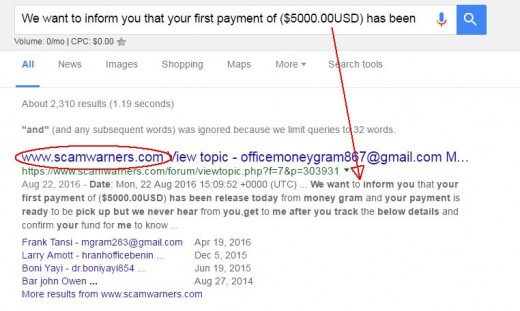

Would you scambait a 419 Nigerian scammer?
What Is Scambaiting
Some people (me included) are actively fighting back against these types of criminals. We are called scambaiters, because we are baiting scammers. We do not do anything illegal. We simply engage them (in very safe ways, so they will never know our personal information), keep them busy - while they are busy with us, they are less likely to scam other people, and often manage to get from them credit card or bank information which the authorities can shut down.
The biggest site on the net currently with a very active forum on scambaiting is http://www.419eater.com/. Well worth reading, highly recommended.
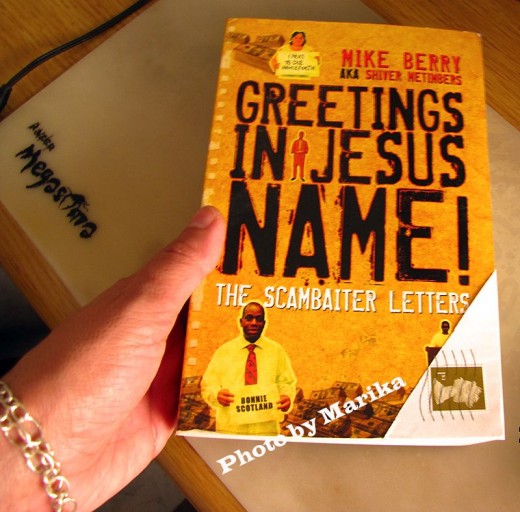
Another book I enjoyed on scambaiting
What Started Me With Scambaiting?
A book. A friend of mine who got scammed a few years ago, wanted to get back to the criminals. She knew that she would never be able to get her money back, but maybe if she could somehow warn others, there would be less victims around to make these scammers rich.
She bought this book and gave it to me afterwards. I was hooked.
I was never scammed, in fact I never gave emails in my Spam folder a second glance, until I came across this book: Greetings In Jesus Name by Mike Berry.
By the time I finished the book (and at 512 pages it is not a think paperback), I was laughing in tears. I've learned in the meantime that scammers are all among us preying on the innocent, and I wanted to do something about it.
I wanted to be that law abiding vigilante that makes scammers life just a bit more difficult. And if I managed to get from them a bank account or 10, so the better. As the authorities are closing them one by one, it deprives them of funds, which means they have less ways to extort people of their own money.

